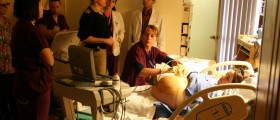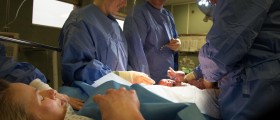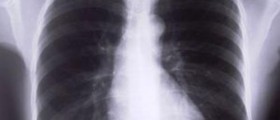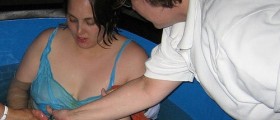
What is Meconium?
Meconium is the first stool of an infant and it differs a bit from the later feces since it is made of different substances ingested during the entire pregnancy. It contains intestinal epithelial cells, lanugo, mucus, amniotic fluid, bile and water. It can be said that meconium is almost sterile comparing to the actual feces but it is very viscous and sticky. These characteristics are what make meconium potentially dangerous if it is aspirated during childbirth.
Namely, meconium is normally stored in the infant's intestine and is eliminated after childbirth. However, under certain circumstances meconium can be expelled into the amniotic fluid prior the birth or during labor and the baby may aspirate the amniotic fluid with meconium with it. The aspirated material may cause total obstruction of baby's airways while smaller amounts of meconium cause chemical irritation of the lungs as well as inactivation of surfactant, a substance that prevents collapse of the lungs. This is a serious condition and requires immediate and adequate treatment.
Clinical Characteristics of Meconium Aspiration
Meconium aspiration is generally a serious and potentially life-threatening condition particularly if the baby inhales too much meconium. Some of the symptoms and signs of meconium aspiration include cyanosis (bluish discoloration of the skin) and changes in breathing patterns such as rapid breathing or transient cessation of respiration. The child is weak and limp. A well-experienced doctor can easily recognize the condition and act promptly in order to help the baby.
Treatment for Meconium Aspiration
Fortunately, since the medicine has advanced over the years today there are many devices that can help people in hitherto complicated illnesses.
The very condition requires prompt action and following specific steps in order to help the affected child. In case a doctor assumes meconium aspiration has occurred the first thing he/ she does is to use Delee suction apparatus. The apparatus is placed in the baby's mouth before it starts to breathe or cry and it can aspirate the near meconium. The following treatment for meconium aspiration includes application of oxygen via oxygen hood or ventilation. Furthermore, the baby is administered antibiotics (in order to prevent infection that may be induced by meconium) and finally, doctors usually administer surfactant and recommend inhalation of nitric oxide.
Meconium aspiration is in many cases a cause of aspiration pneumonia. Patients suffering from aspiration pneumonia require lung rescue therapy. Additional treatments include a warmer that maintains body temperature, light tapping on the chest (loosening of secretions) and application of saline solutions that may clear and wash the airway of thick meconium.
The best thing is to prevent meconium aspiration in the first place.

















Your thoughts on this
Loading...